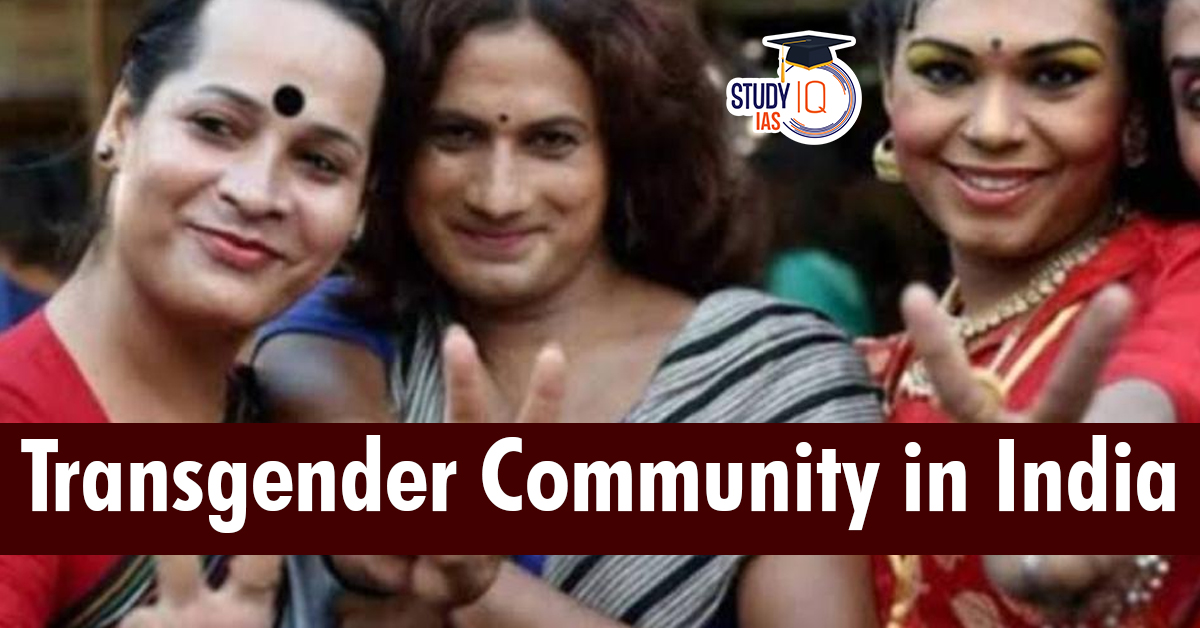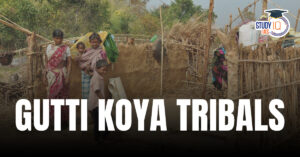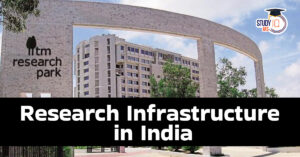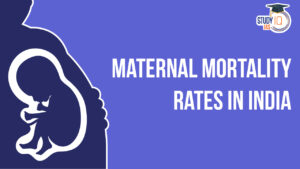Table of Contents
Context: International Transgender Day of Visibility, which is observed on March 31, highlights the challenges that transgender individuals face.
About Transgender Community
- According to the World Health Organization, Transgender is an umbrella term for people whose gender identity and expression do not conform to the norms and expectations traditionally associated with the sex assigned to them at birth.
- They are referred to as transsexuals if they desire medical assistance to make the transition from one biological sex to another.
- As per the Census of India 2011, the total population of Transgenders in India is 4.9lakh
- The highest proportion of the transgender population, about 28%, has been identified in Uttar Pradesh followed by Andhra Pradesh, Maharashtra, Bihar, Madhya Pradesh and West Bengal.
- In India, there is a wide range of transgender-related identities which includes the Hijras, Aravanis, Kothis, Jogtas/ Jogappas, and Shiv Sakthis.
| Key Highlights of the NHRC’s Advisory to the Center, States and UTs for Welfare of Transgender Persons |
|
Challenges Faced by the Transgender Community
- Social Exclusion and Stigma: Persistent societal prejudice, family rejection, and marginalization.
- Bullying and harassment in schools lead to high dropout rates (e.g., 58% dropouts in Kerala).
- Legal and Bureaucratic Barriers: Delays in issuing identity cards under the Transgender Persons (Protection of Rights) Act, 2019.
- The complicated bureaucratic certification process undermines self-identification.
- Economic Discrimination: 92% were excluded from economic activity (NHRC, 2018); many were pushed into sex work.
- High unemployment rate (48% in 2022) compared to the national average
- Biases during recruitment, lack of gender-neutral facilities, workplace hostility.
- Educational Disparities: Transgender literacy rate: 56.1% (2011 Census) vs 74.04% national average.
- Dropouts due to lack of inclusive curricula and discrimination in institutions.
- Health-Care Access Issues: Denial of treatment (27% refused care due to gender identity).
- Gender-affirming surgeries are costly and often not covered under insurance.
- Mental health services are limited and professionals lack training.
Transgender Rights in India
- Third Gender: The Supreme Court in 2014 officially declared ‘transgender’ as the ‘third gender’ in India via the landmark judgment NALSA V. Union of India & Ors (2014).
- The court held that all transgender persons are entitled to fundamental rights under Article 14 (Equality), Article 15 (Non-Discrimination), Article 16 (Equal Opportunity in Public Employment), Article 19(1)(a) (Right to Free Speech) and Article 21 (Right to Life) of the Indian Constitution.
- In 2020, the parliament legally recognized ‘transgender’ as an official gender in India.
- Liberty to Choose Sexual or Gender Identity: In the case of G. Nagalakshmi v. Director General of Police (2014), the Madras High Court observed that in the absence of any special law, any person has the liberty to choose their sexual or gender identity and upheld the petitioner’s right to choose their own gender.
- Right to Privacy: In Puttuswamy v. Union of India (2017), the Supreme Court noted the constitutional right to privacy inherent in the right to life, equality and fundamental freedoms. This includes the right to have intimate relations of one’s choice and the right to sexual orientation and gender identity.
- Decriminalisation of Section 377 of IPC: In Navtej Singh Johar v. the Union of India (2018), the Supreme Court (SC) decriminalised homosexuality by striking off parts of Section 377 of the Indian Penal Code (IPC) which were held violative of Fundamental Rights of LGBTQ Community.
Government Initiatives and Their Gaps
Legal Framework
- Transgender Persons (Protection of Rights) Act, 2019
- Legal recognition of identity.
- Prohibits discrimination in education, employment, and healthcare.
- Shortcomings: Delayed certification, lack of enforcement mechanisms, ignoring issues like police harassment and family rejection.
Welfare and Financial Schemes
- National Portal for Transgender Persons for ID applications.
- But only ~66% of certificates were issued by Dec 2023; many were delayed.
- Ayushman Bharat TG Plus card for ₹5 lakh annual coverage.
- Shortcomings: Low awareness, poor implementation, exclusion from mainstream health services.
- 2024: Finance Ministry allows LGBTQ+ joint bank accounts and nominations.
- Shortcoming: Financial services still lack broader inclusivity.
Transgender Persons (Protection of Rights) Act, 2019
The Transgender Persons (Protection of Rights) Act, 2019 aims to end discrimination against transgender persons in accessing education, employment and healthcare. Key Provisions of the Act Include:
- Definition of a transgender person: It defines a transgender person as one whose gender does not match the gender assigned at birth.
- It includes trans-men and trans-women, persons with intersex variations, gender queers, and persons with socio-cultural identities, such as kinnar and hijra.
- Intersex variations are defined to mean a person who at birth shows variation in his or her primary sexual characteristics, external genitalia, chromosomes, or hormones from the normative standard of the male or female body.
- Prohibition against discrimination: The Act prohibits discrimination against a transgender person, including denial of service or unfair treatment in relation to: (i) education; (ii) employment; (iii) healthcare; (iv) access to, or enjoyment of goods, facilities, opportunities available to the public; (v) right to movement; (vi) right to reside, rent, or otherwise occupy property; (vii) opportunity to hold public or private office; and (viii) access to a government or private establishment in whose care or custody a transgender person is.
- Right of residence: Every transgender person shall have a right to reside and be included in his household.
- If the immediate family is unable to care for the transgender person, the person may be placed in a rehabilitation centre, on the orders of a competent court.
- Employment: No government or private entity can discriminate against a transgender person in employment matters, including recruitment, and promotion.
- Every establishment is required to designate a person to be a complaint officer to deal with complaints about the Act.
- Education: Educational institutions funded or recognised by the relevant government shall provide inclusive education, sports and recreational facilities for transgender persons, without discrimination.
- Health care: The government must take steps to provide health facilities to transgender persons including separate HIV surveillance centres, and sex reassignment surgeries.
- The government shall review the medical curriculum to address the health issues of transgender persons and provide comprehensive medical insurance schemes for them.
- Certificate of identity for a transgender person: A transgender person may make an application to the District Magistrate for a certificate of identity, indicating the gender as ‘transgender’.
- Offences and penalties: The Act recognize the following offences against transgender persons: (i) forced or bonded labour (excluding compulsory government service for public purposes), (ii) denial of use of public places, (iii) removal from household, and village, (iv) physical, sexual, verbal, emotional or economic abuse. Penalties for these offences vary between six months and two years, and a fine.
- National Council for Transgender Persons (NCT): The Council will advise the central government as well as monitor the impact of policies, legislation and projects with respect to transgender persons. It will also redress the grievances of transgender persons.
- The NCT will consist of:
- Union Minister for Social Justice (Chairperson);
- Minister of State for Social Justice (Vice-Chairperson);
- Secretary of the Ministry of Social Justice;
- one representative from ministries including Health, Home Affairs, and Human Resources Development.
- Other members include representatives of the NITI Aayog and the National Human Rights Commission.
- State governments will also be represented.
- The Council will also consist of five members from the transgender community and five experts from non-governmental organisations.
- The NCT will consist of:
Steps to Mainstream Transgender Individuals
- SMILE (Support for Marginalized Individuals for Livelihood and Enterprise): This scheme has been launched by the Ministry of Social Justice and Empowerment. Key features include:
- Counseling, basic documentation, education, skill development, financial assistance to transgender students.
- Composite medical health and setting up of Garima Grehs in each state for providing shelter facilities for abandoned and orphaned transgender persons.
- Transgender protection cells in India provide quick redressal of offences & crimes against transgender persons.
- National Education Policy 2020: NEP 2020 identifies transgender children as Socio-Economically Disadvantaged Groups and provides for equitable quality education for all such students.
- A ‘Gender-Inclusion Fund’ will be constituted under the new policy to build the nation’s capacity to provide equitable quality education for all girls as well as transgender students.
- PM-DAKSH: The Ministry of Social Justice and Empowerment is imparting skill development training to the Transgender beneficiaries of the SMILE Scheme through PM-DAKSH.
- Strengthen Policy Implementation:
- Simplify and fast-track ID card issuance.
- Ensure effective grievance redressal and enforcement of anti-discrimination laws.
- Include specific protection against police harassment and family-based exclusion.
- Promote Economic Empowerment: Diversity hiring policies across industries (as seen in Tata Steel).
- Government-backed loans for transgender entrepreneurs.
- Targeted skill development and vocational training.
- Inclusive financial services beyond symbolic reforms.
- Improve Education Access: Introduce gender-sensitive curricula.
- Anti-bullying mechanisms in schools and colleges.
- Scholarships and hostel facilities tailored for transgender students.
- Enhance Health-Care Services: Mandatory training for medical professionals on transgender health.
- Coverage of gender-affirming procedures under public and private insurance.
- Set up dedicated transgender health clinics and strengthen mental health support.
- Foster Social Acceptance: Media representation in non-stereotypical roles.
- Cultural inclusion (e.g., promoting events like Koovagam Festival)
- Awareness campaigns like ‘I Am Also Human’.
- Gender sensitisation programs in schools, colleges, and workplaces.
State Laws to Protect the Transgender Population
- Odisha – ‘Sweekruti’: To secure the rights of transgender persons and ensure equitable justice. Skill up-gradation, legal aid, health care provision.
- Kerala: Transgender policy in 2015, Schools, Justice board for welfare of transgenders, Fully Transgender run metro station, G-Taxis: entirely owned and run by transgenders, free sex-reassignment surgeries.
- Reserved seats in universities, and dedicated hostels.
- Shortcoming: No national-level replication; limited impact.
- Reserved seats in universities, and dedicated hostels.
- Tamil Nadu: Transgender welfare policy, free surgeries, the first state to form a Transgender board with members from the community.
- Chandigarh: Transgender board comprising members from all departments viz., police, health, social welfare, education and the law department.
- Maharashtra: Transgender cells in colleges.
Way Forward
- Acceptance: The social stigma attached to the transgender community needs to be eliminated through a multifaceted strategy with a focus on public awareness initiatives.
- To recognize the transgender community as an essential part of societal life, there needs to be widespread sensitization, beginning at the school level.
- Education: It’s crucial to develop an efficient system for educating students at colleges and universities on the needs and makeup of the transgender community.
- Financial Security: To begin their career as an entrepreneur or businessman, it is important to guarantee liberal credit facilities and financial help.
- Employment: Plans and initiatives should focus on enhancing the skills of transgender communities. The hiring, retention, and promotion processes must successfully abide by anti-discrimination policies.
- Transgender-Inclusive Policies: Legal and law enforcement systems need to be empowered and sensitized on the issues of Transgender community.


 Gutti Koya Tribals in Post-Conflict Indi...
Gutti Koya Tribals in Post-Conflict Indi...
 Research Infrastructure in India for its...
Research Infrastructure in India for its...
 Maternal Mortality Rate in India, State ...
Maternal Mortality Rate in India, State ...





















